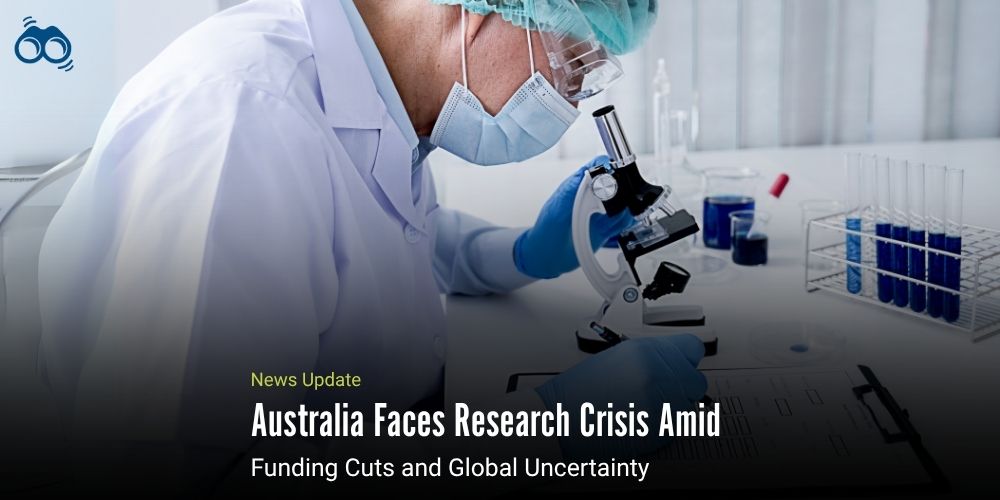Australia’s Research Sector Faces Uncertain Future Amid Funding Cuts
Experts Warn: Declining Research Investment Threatens Innovation
Australian universities are increasingly raising concerns over research funding, warning that the current trajectory is unsustainable and could undermine the nation’s academic competitiveness. Vicki Thomson, CEO of the Group of Eight Universities, has described the situation as a “perfect storm” of financial challenges, stressing that funding shortfalls must be addressed to prevent long-term consequences.
Thomson highlighted the convergence of several troubling factors, noting that while government and business investment in research has declined, universities have stepped in to fill the gap. However, this has largely been achieved by increasing their financial contributions through international student revenue, a model she insists is insufficient for sustaining research excellence. In addition, she underscored the impact of developments in the United States, Australia’s largest research collaborator, where the Trump administration has made severe budget cuts to Ivy League institutions, reducing their research funding by billions.
The decline in research investment has already affected Australian projects, particularly those focused on diversity, equity, inclusion, and climate science. According to Thomson, these areas have suffered funding losses estimated between $300 and $400 million. Professor Richard Holden echoed these concerns, warning that uncertainty surrounding research investment could exacerbate the sector’s long-term decline. Experts have also flagged concerns over a broader pattern of reduced research funding in Australia, citing a 15-year decline in investment from both major political parties. Professor Holden pointed out that research and development (R&D) expenditure, as a share of GDP, was significantly higher during Kevin Rudd’s tenure as Prime Minister than in 2023. Over the years, contributions from both business and government have fallen, leaving universities as the only sector increasing investment, primarily through international student fees.
Holden further warned that Australia’s reliance on international student revenue to fund sovereign research capacity has created a strategic vulnerability, describing it as an “addiction.” He cautioned that this dependence, particularly amid global instability, is risky, as such income sustains vital research infrastructure. His concerns were heightened by recent election pledges to cap international student numbers, further exposing the fragility of the current funding model. Nobel laureate Professor Brian Schmidt supported this assessment, describing the situation as deeply troubling.
Beyond economic risks, Schmidt also emphasised the strategic importance of research for national defence. Citing the Russia-Ukraine war, he pointed to emerging technologies such as autonomous systems, hypersonic missiles, and cyber warfare as factors reshaping modern conflict. He argued that a nation’s research capability could be crucial in determining future outcomes. Moreover, Schmidt issued a stark warning about the contrasting approaches of global powers. While countries like Australia and the United States have cut research funding, China has significantly increased its investment, a trend he described as "sobering." He noted that research capacity takes decades to build, and in times of crisis, nations must rely on existing expertise, as there is no time to develop new systems or train researchers.
Thomson also expressed concern over the worsening state of Australia’s research funding, citing substantial budget cuts to major U.S. agencies such as the National Science Foundation and the National Institutes of Health (NIH). She warned that these reductions could disrupt Australian research partnerships, including projects in healthcare, such as Melbourne’s mRNA vaccine facilities, which rely on U.S. funding. Stressing the importance of international collaboration, she asserted that research cannot be sustained through domestic expertise alone.
To address funding challenges, Australian universities are actively exploring alternative sources. Thomson stated that universities are working with the government to deepen engagement with Horizon Europe, the world’s largest research fund, with a €95 billion budget. She argued that Australia has long had the opportunity to align more closely with this initiative and should seize the moment for strategic innovation and realignment in the research sector. Meanwhile, Holden suggested that with the United States stepping back from its leadership role in research, Australia now has a unique opportunity to attract top American researchers. He asserted that, with decisive action, the nation could position itself as favourably as Europe for relocating talent and strengthening its global research standing.
Holden further stressed that, amid rapid technological advancements and geopolitical shifts, research investment presents major opportunities for Australia. He acknowledged the uncertainty ahead but maintained that the nation can shape its future. He concluded that Australia must choose between securing its research sovereignty or risking its decline, expressing hope that decisive action would be taken. The future of Australia’s research sector hangs in the balance, with urgent reforms needed to secure long-term sustainability and global competitiveness.
Editor’s Note:
The sustained reduction in research funding poses a substantial threat to Australia's academic and scientific progress. Universities, pivotal to research and innovation, are increasingly reliant on international student fees to support essential endeavours. This funding model presents inherent vulnerabilities, primarily due to the susceptibility of international student enrollment to geopolitical fluctuations. In the absence of a stable financial foundation, Australia faces the risk of diminished competitiveness in global research, particularly against nations such as China, which are markedly augmenting their investment in research infrastructure. Academic leaders, including Vicki Thomson and Professor Richard Holden, have articulated concerns regarding the imperative to address this matter expeditiously to avert irreversible long-term ramifications. To ensure the sustainability of Australia's research enterprise, it is imperative that policymakers promptly establish funding mechanisms that are not contingent upon student enrollment levels. Increased engagement in international research initiatives, such as Horizon Europe, and the recruitment of distinguished international researchers are recommended strategies.
Skoobuzz stresses that a strong research sector is vital for economic growth, national security, and global influence. Without decisive action, Australia's position in higher education and science is at risk. Clear steps are needed to protect research and lead in innovation.














0 Comments (Please Login To Continue)